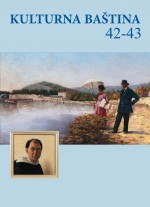Konzulati i konzuli u Splitu za vrijeme druge austrijske uprave (1815. – 1914.)
Consulates and Consuls in Split During the Second Austrian Administration (1815 – 1914)
Author(s): Gordana TudorSubject(s): Diplomatic history, Local History / Microhistory, Political history, International relations/trade, 19th Century, Pre-WW I & WW I (1900 -1919)
Published by: DRUŠTVO PRIJATELJA KULTURNE BAŠTINE - SPLIT
Keywords: Austria; Austro-Hungary; Split; consular offices;
Summary/Abstract: To the extent of our knowledge, it was an archivist from Zadar, Šime Peričić, who, fifty years ago, was the first to address the role of consuls in Dalmatia. Therefore we believe that the significance and role of consuls in Split during the second Austrian administration should be given more attention. Foreign consular offices were established in both Split and Dalmatia during Venetian, French and Austrian administrations. Several consular offices were reestablished during the Congress of Vienna, that is, after Austria had annexed Dalmatia. Austrija was against establishing foreign consular offices in its ports at first, but then consented to it. The Kingdom of the two Sicilies was the first to establish the office in Split. The consular agent of the Kingdom of Naples, Domenico Castoldi, was granted permission to resume his consular activities in Split in the early 1814. Two other states on the Apennine Peninsula, Papal State and the Duchy of Parma, had their respective offices in Split. Greece, France, Germany, Sweden, Norway, Belgium and Uruguay established their consular offices in Split, as well. As representatives of Italy, consuls of exclusively Italian origin with extensive experience in diplomacy were assigned the office. As for the representatives of other states, they were elected among local citizens. Those were usually renowned individuals who were active either in political or social lives of their communities. In Split, those were notable wholesalers and politicians, who supported either the People’s Party or the Autonomist Party. Having used a number of available resources, the authors have attempted to analyse the involvement of consuls in various associations and in the economic life of the city. The analysis is, however, incomplete, since the information on all the consuls and their activities is rather scarce. Yet, the authors have managed to establish that the majority of consuls in Split originated from the Katalinić and the Jeličić families.
Journal: KULTURNA BAŠTINA : ČASOPIS ZA PITANJA PROŠLOSTI SPLITSKOGA PODRUČJA
- Issue Year: 2017
- Issue No: 42-43
- Page Range: 31-50
- Page Count: 20
- Language: Croatian

